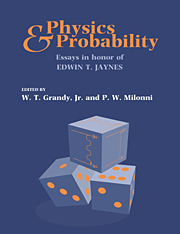Book contents
- Frontmatter
- Contents
- Preface
- Recollections of an Independent Thinker
- A Look Back: Early Applications of Maximum Entropy Estimation to Quantum Statistical Mechanics
- The Jaynes–Cummings Revival
- The Jaynes–Cummings Model and the One-Atom-Maser
- The Jaynes–Cummings Model is Alive and Well
- Self-Consistent Radiation Reaction in Quantum Optics – Jaynes' Influence and a New Example in Cavity QED
- Enhancing the Index of Refraction in a Nonabsorbing Medium: Phaseonium Versus a Mixture of Two-Level Atoms
- Ed Jaynes' Steak Dinner Problem II
- Source Theory of Vacuum Field Effects
- The Natural Line Shape
- An Operational Approach to Schrödinger's Cat
- The Classical Limit of an Atom
- Mutual Radiation Reaction in Spontaneous Emission
- A Model of Neutron Star Dynamics
- The Kinematic Origin of Complex Wave Functions
- On Radar Target Identification
- On the Difference in Means
- Bayesian Analysis, Model Selection and Prediction
- Bayesian Numerical Analysis
- Quantum Statistical Inference
- Application of the Maximum Entropy Principle to Nonlinear Systems Far from Equilibrium
- Nonequilibrium Statistical Mechanics
- A Backward Look to the Future
- Appendix: Vita and Bibliography of Edwin T. Jaynes
- Index
Quantum Statistical Inference
Published online by Cambridge University Press: 21 October 2009
- Frontmatter
- Contents
- Preface
- Recollections of an Independent Thinker
- A Look Back: Early Applications of Maximum Entropy Estimation to Quantum Statistical Mechanics
- The Jaynes–Cummings Revival
- The Jaynes–Cummings Model and the One-Atom-Maser
- The Jaynes–Cummings Model is Alive and Well
- Self-Consistent Radiation Reaction in Quantum Optics – Jaynes' Influence and a New Example in Cavity QED
- Enhancing the Index of Refraction in a Nonabsorbing Medium: Phaseonium Versus a Mixture of Two-Level Atoms
- Ed Jaynes' Steak Dinner Problem II
- Source Theory of Vacuum Field Effects
- The Natural Line Shape
- An Operational Approach to Schrödinger's Cat
- The Classical Limit of an Atom
- Mutual Radiation Reaction in Spontaneous Emission
- A Model of Neutron Star Dynamics
- The Kinematic Origin of Complex Wave Functions
- On Radar Target Identification
- On the Difference in Means
- Bayesian Analysis, Model Selection and Prediction
- Bayesian Numerical Analysis
- Quantum Statistical Inference
- Application of the Maximum Entropy Principle to Nonlinear Systems Far from Equilibrium
- Nonequilibrium Statistical Mechanics
- A Backward Look to the Future
- Appendix: Vita and Bibliography of Edwin T. Jaynes
- Index
Summary
ABSTRACT. Can quantum probability theory be applied, beyond the microscopic scale of atoms and quarks, to the human problem of reasoning from incomplete and uncertain data? A unified theory of quantum statistical mechanics and Bayesian statistical inference is proposed. QSI is applied to ordinary data analysis problems such as the interpolation and deconvolution of continuous density functions from both exact and noisy data. The information measure has a classical limit of negative entropy and a quantum limit of Fisher information (kinetic energy). A smoothing parameter analogous to a de Broglie wavelength is determined by Bayesian methods. There is no statistical regularization parameter. A priori criteria are developed for good and bad measurements in an experimental design. The optimal image is estimated along with statistical and incompleteness errors. QSI yields significantly better images than the maximum entropy method, because it explicitly accounts for image continuity.
Introduction
Jaynes has been an eloquent advocate for a compelling hypothesis: Probability Theory as Logic. That is, probabilities represent degrees of belief; probability theory develops and applies universal principles of logical inference from incomplete information. Two of his primary interests have been Bayesian probability theory and the interpretation of quantum mechanics. Bayesian probability theory yields inferences by systematically and consistently combining new data with prior knowledge. Jaynes pioneered the maximum entropy (ME) class of Bayesian methods for density function estimation (Jaynes, 1983), which has been applied successfully to numerous data analysis problems.
- Type
- Chapter
- Information
- Physics and ProbabilityEssays in Honor of Edwin T. Jaynes, pp. 223 - 238Publisher: Cambridge University PressPrint publication year: 1993
- 4
- Cited by



